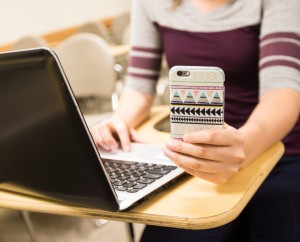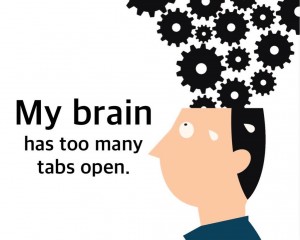
Photo Courtesy of Brigham Young University
In class Andrew discussed some possible methods for preventing phone use in classrooms. Most people can agree that using phones and technology in the classroom might bring on some distractions. People just cannot wait to see why their phone vibrated and who just posted something on social media. I am no exception to this habit. Some students call themselves “multitasking masters”. They claim the ability to multitask by doing schoolwork and using technology to socialize with friends all while efficiently completing their work. My friends constantly boast about their multitasking abilities so I wanted to find out whether they could be justified in their remarks. The first study on the topic I considered was published by Elsevier with ScienceDirect. The main goal of the study was to examine the relationship between multitasking and academic performance, particularly in terms of GPA. I know that I personally am not as efficient while multitasking, however it would be an anecdote to simply say that since I cannot do it, other people must not be capable of doing it either.
The methods for the study involved a sample size of more than 3800 U.S. college students. The students were asked numerous questions regarding their study habits as well as use of technology in the past two days. They were also asked how much time the student uses ICT while doing schoolwork at the same time. The study accounted for a huge number of third variables including ones such as gender, ethnicity, parents education, and much more. The student’s high school GPA was used as a control variable in this case.
The study found a linear regression that using technology for social media and unrelated topics have a negative effect on a student’s GPA. The proposed mechanism for why multitasking with technology and schoolwork is not effective makes a lot of sense. The study brings up the point that because the human brain cannot focus on two things at once, it will take you more time to get the same amount of studying done if you are getting distracted by technology and social media. When students try to multitask they end up not processing their schoolwork which is likely why there is a negative correlation between “multitasking” and a student’s overall GPA.

Photo Courtesy of Powerofpositivity.com
Neuroscientist Earl Miller explains that it is truly impossible to multitask (NPR). However, even though we can’t multitask we can still switch tasks at an astonishing speed.
While this study does seem to be rather convincing, there are some concerns that might arise from the results. First of all, using student’s high school GPA’s as a control variable could lead to incorrect conclusions. In my opinion, you should not compare high school and college GPA’s to make conclusions about one’s multitasking abilities. Another possible confounding variable is the method in which students multitask. Some students might check their phone every 15 minutes, while others are constantly looking at their phone or other technology. The most serious limitation to this study is that it cannot accurately rule out third variables and failed to rule out reverse causation. Is multitasking causing a lower GPA or is a lower GPA causing multitasking, or maybe it is a third variable that causes both.
Even with the many flaws, the study was able to provide some key data that helps to configure a conclusion on this topic. Other studies provide evidence that multitasking while doing schoolwork is not as efficient than if a person was not attempting to multitask. Although you still may think you can multitask while doing schoolwork, it’s probably a good idea to put your phone away and log off of facebook so that you do not get distracted. When I do work I have to turn off my phone to avoid getting distracted. I find myself much more focussed and efficient without the distractions.
Works Cited:
Hamilton, Jon. “Think You’re Multitasking? Think Again.” NPR Research News, National Public Radio, 2 Oct. 2008, www.npr.org/templates/story/story.php?storyId=95256794. Accessed 19 Oct. 2016.
“The relationship between multitasking and academic performance.” Elsevier, vol. 2, no. 52, Sept. 2012, www.sciencedirect.com/science/article/pii/S036013151100340X. Accessed 18 Oct. 2016.
Weimer, Maryellen. “Students Think They Can Multitask. Here’s Proof They Can’t.” Colorado State University, old.biz.colostate.edu/mti/tips/pages/Students-Think-They-Can-Multitask—Here’s-Proof-They-Can’t.aspx.

I don’t understand why our generation thinks that they are able to multi-task all the time. It is just not possible the human brain can only focus on one thing at a time. People think that multi-tasking is a good thing but it actually does more harm than good.
I agree with a lot of the points made in your post. I actually just wrote a post about the difference between taking notes on a computer versus taking notes on a notebook and one of the possible mechanisms for a lower test performance of those who take notes on a laptop was distractions. Even just the notification of a computer update can cause students to lose focus and can have a detrimental effect on their grades.
I really enjoyed reading your blog post. I too know that I am less efficient when I have my phone near me when I am trying to study or complete a homework assignment. I think that your research is very thorough and you explained the study really well. I also liked how you mentioned the problems the study and why you think that the results should not be considered completely reliable. Specifically, I thought it was cool that you mentioned that the researchers should have thought about reverse causation. I found this article which discusses other findings about multitasking. It mentions that people have different interpretations of what multitasking is, some people consider it to be doing two things at once whereas others think that it is switching between two different tasks. This is another variable that the study you mentioned did not consider when evaluating the participants. The article also describes one study where the multitaskers did not do worse than non-multitaskers in a specific test. I found this result pretty shocking. Multitasking is definitely a topic I think is really interesting and that should be looked into more.
I agree with the fact that multi tasking affects our ability to learn. Especially in big lecture halls where there are many students, cellphones and laptops can have a very big distraction on your learning. I have also looked into this topic and found an interesting study reinforcing the fact that distraction can hinder your learning abilities greatly. http://www.ugr.es/~victorhs/gbd/docs/10.1.1.9.9018.pdf .This experiment involved 2 groups of students where one group was allowed to use their laptops while the other group was not allowed. Both groups received the same lecture and the same quiz afterwards. The students who were not distracted did significantly better.